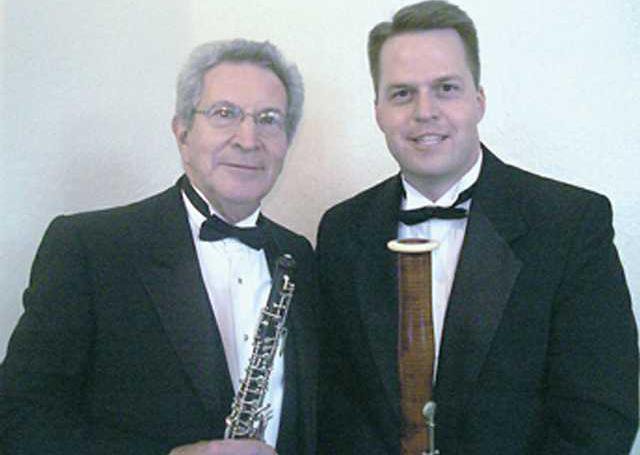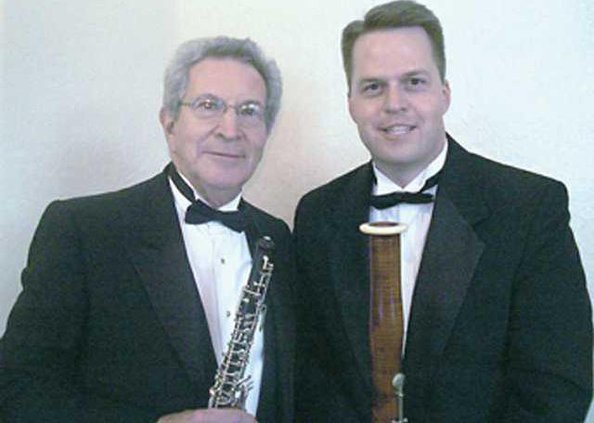gnam
Adrian Gnam, conductor for the Macon Symphony Orchestra, talks about the time commitment required for anyone thinking of seriously studying an instrument.The idea for the concert has been years in the making — decades, even. It was simply a matter of finding the right conductor to trade with.
Gregory Pritchard, music director and conductor of the Gainesville Symphony Orchestra, said the idea to have a concert where the conductor traded places with a guest, each taking turns as conductor and soloist, came about as a project in college.
"I had just been waiting for the right opportunity, and it came along with Adrian (Gnam)," he said of the conductor of Macon’s Symphony Orchestra. The two conductors met as faculty members at the International Conductor’s School in Macon, and realized they had double woodwind instruments in common as well.
Pritchard has been playing the bassoon since he was in the ninth grade; Gnam said he has been playing the oboe for much of his 67 years.
On Saturday, Pritchard and Gnam will headline the Gainesville Symphony Orchestra’s spring concert, "Trading Places." Pritchard will take the stage as bassoon soloist for the opening number, Beethoven’s "Symphony No. 1" and Weber’s "Andante and Hungarian Rondo" with Gnam conducting. Then, after an intermission, the two will switch off, with Pritchard conducting while Gnam solos on Cimarosa’s "Oboe Concerto" and Meldelssohn’s "Symphony No. 4, Italian."
Along with teaching oboe at Mercer University, Gnam’s earlier career as an oboist includes performing with the Cleveland Orchestra under the direction of George Szell, who led the orchestra for 24 years. He has also worked with conductor Leopold Stokowski, best known for his work with the original "Fantasia" movie.
"For me, it’s been my entire life I’ve played the oboe," Gnam said. "I’ve played in a number of major orchestras, and I just love to play the instrument."
It’s important to split his time between the two specialties, he said, because conducting, when you are familiar with the performance side, adds depth to the overall orchestra.
"And many conductors, once they become a conductor, they quit their instrument. They don’t play anymore," he said. "But I’ve always felt it was important to keep up the actual playing because when you conduct an orchestra and they know you’re a performer, they actually play better knowing you have to go through the same routine that they have to go through.
"Greg is the same way — Greg has continued his playing. We’re very much of the same background — we both play double reed instruments. We’ve kept the performing music, chamber music and orchestral music part of our lives."
Pritchard said he remains a bassoon player in several orchestras, along with being director of the orchestral program at Brookwood High School in Snellville. But it was working under a talented music director in college that brought Pritchard into the world of conducting, he said.
As a bassoonist at Michigan State University, Pritchard looked to his conductor, Leon Gregorian, for inspiration.
"I eventually got my doctorate in conducting there. (Gregorian) was very inspiring, and I played under him in the orchestra for all three of my degrees," he said. "That’s what got me into the conducting."
Despite his performance history, he said it’s still a bit nerve wracking knowing he’s about to do a solo with an orchestra for the first time.
"It takes a lot of practice. I spent hours studying conducting scores, but because I’ve been doing it for so long, I’m very comfortable with it," he said. "And soloists, they spend hours working on their instrument. And if you’re dedicated with your instrument, to do both you basically have to do double duty."
Overall, he said, the secret to the performance comes down to practice, practice, practice.
"By itself, I’m a professional musician. I’ve performed as a bassoonist for years, I’ve performed as a conductor for years," he said. "But to do both on the same program, it does take a lot of preparation."




